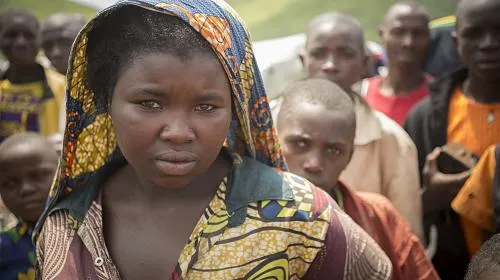KINSHASA (August 6, 2018) – CARE is deeply concerned about a new Ebola virus outbreak in the northeast of the Democratic Republic of Congo (D.R.C), risking the lives of 300,000 Congolese. 37 cases, including 22 deaths, have been reported so far. Although this is the 10th Ebola outbreak in the country since 1976, this time fears for an unprecedented expansion rise. “The proximity of the affected area to Uganda is highly alarming. Many people are moving between the borders on a daily basis. If we want to prevent another wave of deaths, precautions need to be taken urgently in both countries,” says Tom Friedeberg, CARE’s Country Director in DRC.
Since 2017, increasing violent conflict and inter-communal tensions especially in the east of the country have put extreme pressure on the population and forced thousands of Congolese to flee their homes. “The Ebola outbreak could not happen at a worse time,” says Friedeberg. “People are suffering from violence outbreaks due to the ongoing conflict and are often forced to flee their homes. This makes them even more vulnerable to the disease, and multiplies the risk for the disease to spread.”
After years of experience in responding to Ebola virus outbreaks, the country knows how to diagnose and control the disease. However, local health facilities are understaffed and the access to medical supplies and specialized equipment remains among the most urgent challenges.
CARE has released $200,000 to scale up its response, focusing on the prevention of the Ebola virus into other parts of the country. “CARE works in Mufwanga, close to the affected area. We are currently assessing existing health facilities to identify their needs and start responding quickly. We need to do everything we can to prevent the virus from spreading,” says Friedeberg. In addition, CARE’s team in DRC is planning to distribute hygiene items, such as water purification tablets, soap and other sanitation goods including self-protection equipment to people living in the Beni territory.
CARE has been working in DRC since 1994, initially responding to a refugee crisis following the Rwandan genocide. Prioritizing the prevention of the Ebola expansion, our team in DRC will continue monitoring closely the situation of those affected and especially of women and girls, as conditions are expected to deteriorate further in the coming weeks.
About CARE:
Founded in 1945 with the creation of the CARE Package®, CARE is a leading humanitarian organization fighting global poverty. CARE places special focus on working alongside women and girls because, equipped with the proper resources, they have the power to lift whole families and entire communities out of poverty. That’s why women and girls are at the heart of CARE’s community-based efforts to improve education and health, create economic opportunity, respond to emergencies and confront hunger. Last year CARE worked in 93 countries and reached more than 63 million people around the world. Learn more at care.org.
Media contact:
Mahmoud Shabeeb, mshabeeb@care.org, +962-79-146-39-03, Skype: mahmoud.shabeeb_1 (based in Amman, Jordan)
Nicole Harris, nharris@care.org, 404-735-0871

